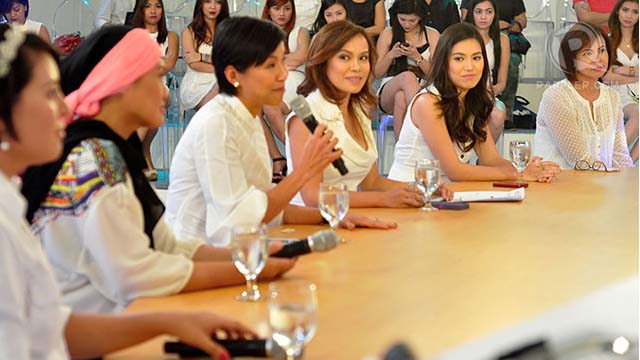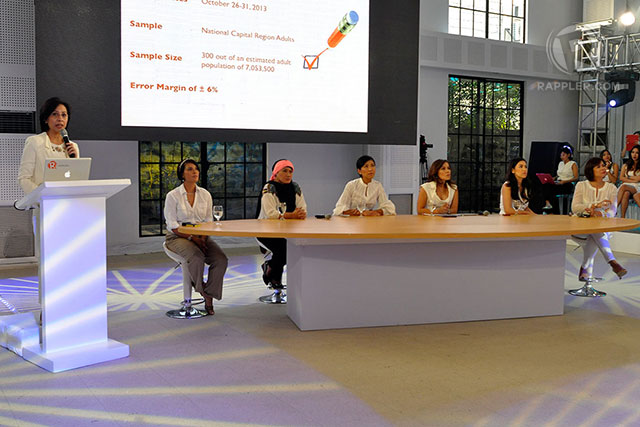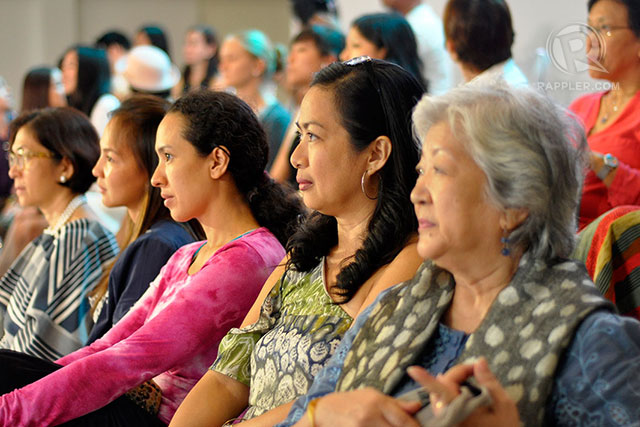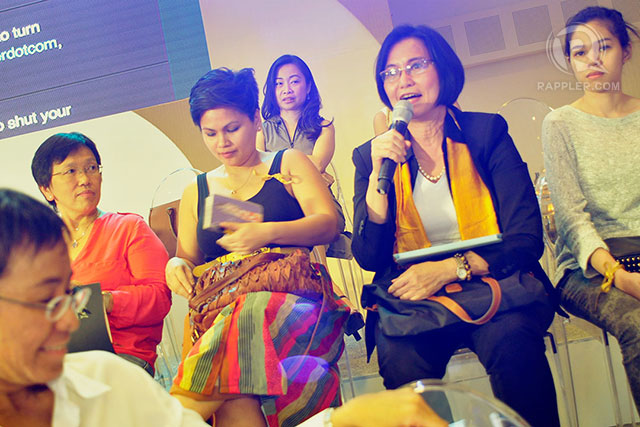SUMMARY
This is AI generated summarization, which may have errors. For context, always refer to the full article.

MANILA, Philippines – Have your ever been boxed in “because you’re a woman”? Welcome to the club!
Despite a narrowing gap between men and women in the Philippines, double standards and gender bias still persist, even in the national capital region (NCR). The glass ceiling is still sturdy and unwilling to budge – especially when it comes to education and women’s roles in society.
At #WHIPIT, a forum on gender bias held Tuesday, November 26, Pantene and Rappler presented the results of an NCR-wide survey on women issues that they commissioned. Female trailblazers from different fields sounded off on the results and voiced their thoughts on how best to overcome perceived “limitations.”
“People told me: ‘She’s too ambitious,'” said actress, blogger, and Rappler columnist Giselle Tongi-Walters. “Like it’s a bad thing.”
Three hundred adults from different socioeconomic background were included in the survey, conducted by Laylo Research Strategies Oct 26-31, 2013. Although it painted a fairly liberated view of women, the survey showed certain biases against women.
Women vs women

When it comes to perceptions in the workforce, 54% of women in the survey believed working women tend to be “pushy.”
Ana Santos, Rappler columnist and forum moderator, asked: Is pushy a bad thing or are we just defining it as bad?
“Sometimes it’s positive, sometimes it’s negative. [Mostly with men], pushy becomes aggressiveness and aggression means negativity,” said Samira Gutoc, 2001 TOYM Awardee for Youth and Leadership in Social and Cultural Development.
For Rappler multimedia reporter Natashya Gutierrez, being “pushy” is part of the job. “If you’re not pushy, you don’t get the story. When I started working in this field, you realized that you really need to push.”
How can women strike a balance between between pushy and charming? Santos said that sometimes, the charming route can work for women – or men – in any profession: “You get more bees with honey than vinegar.”
But it depends on the situation, said Gutierrez.
“When I’m covering politics, you can’t be sweet and charming because politicians are going to take it in a different way,” she said.
That society underestimated her capabilities, particularly in sports reporting, helped her improved, said Gutierrez.
Sex, culture, women
Fresh from covering the Pacquiao-Rios bout in Macau, Gutierrez said she encountered gender stereotypes. “If a woman journalist opened her mouth, all the men would turn around…and you could just feel that sort of expression in the air: I wonder if this woman knows what she’s talking about.”
“I took that as motivation to read more. I know more about boxing than most of the men here,” she said. She’s also encountered people who thought she was only able to break stories by sleeping her way up, which is an insult, she said.
Felicia Atienza, who leveraged the buyout of the Merrill Lynch office in the Philippines, said that in her previous life in the corporate world, she also encountered that stereotype – that she had to sleep her way to the top. Now she’s the founder and president of the Chinese International School Manila, the first internationally-accredited campus in the Philippines to offer comprehensive Mandarin classes for K-12 students.

The climb to the top also means overcoming not just gender but cultural stereotypes as well, said Gutoc, a prominent voice in the Philippine Muslim community. When she was in college, she’d be called “princess.”
“They didn’t know about my background, but they’d call you a princess. Being a called a princess wasn’t empowering, it was being labelled. Where’s the crown? There’s no crown here,” said Gutoc.
“At the same time, may experience rin na…who wants to be called Abu Sayyaf? When I was [hailing] a tricycle in college, they didn’t let me in,” she said.
An education
When push comes to shove and jobs are hard to come by, a whopping 70% of survey respondents believed men deserved employment more than women. It’s an odd result in a country where there are more jobless males, according to a March 2013 labor force survey.
Women also tend to take a backseat when it comes to education, at least according to the survey: 65% of respondents said that it’s more important for men to finish a university education. This, despite a world report that said the Philippines had closed the gender gap in education and health.

It’s a perception that stems from the idea that men are more likely to support extended family compared to women, said Chay Hofileña, Rappler’s Investigative Desk Editor.
“Education begins at home,” said Atienza.”We are a matriarchal society. Being women, we are always giving, sacrificing. We’re the ones caring, nurturing, and when push comes to shove, we’ll say: okay, we’ll let the man have it,” said Atienza.
Karrie Ilagan, the first Filipino to be appointed managing director of Microsoft Philippines, said the key is to focus on competence and skill. “There’s a huge shift in many industries where employers or leaders look at competence,” she said.
“Whether you’re male or female, your achievement could only be limited by where you want to take your career. A big part of it is the societal shift of perception that men and women are just equal. Today’s society is really about competence,” she said.
Education, said Tongi, isn’t just about finding your spot in the workplace. “The more women are educated, the more they realize their own worth.”
Women in the workforce
But does moving up in the world also mean being a little less “you”?
The survey showed 70% of men thought women needed to downplay their personalities to be accepted.

“We want to have it all. We want a family in whatever form that comes in. We want to have everything,” said Santos. Survey respondents were split when asked about women choosing between family and careers.
Gutoc, who was a lawmaker in the Autonomous Region in Muslim Mindanao, emphasized the need for the young people from the province – male and female alike – to venture out of their comfort zones.
“For those young people from the provinces, you might want to study in Manila so we can find our way. I found my way and my strength here,” she said.
The forum was also a reminder that for every empowered Filipina, there are more who don’t have a choice – because societal and socioeconomic restrictions won’t let them. – Rappler.com
#WHIPIT – A challenge for women to be empowered and shine boldly by defying beyond labels and stereotypes
Watch out for the full results of the survey and more discussions on gender bias here on Rappler. You can also join our #WHIPIT Wednesdays conversations.
Add a comment
How does this make you feel?
There are no comments yet. Add your comment to start the conversation.